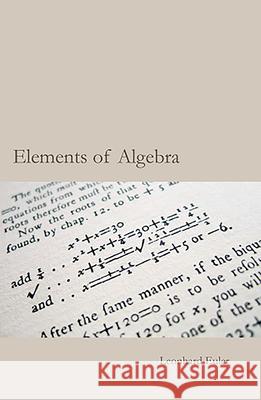Euler's Elements of Algebra » książka
Euler's Elements of Algebra
ISBN-13: 9781899618798 / Angielski / Miękka / 2006 / 300 str.
Leonhard Euler (1707-1783) is one of the most influential and prolific mathematicians of all time. His Elements of Algebra is one of the first books to set out algebra in the modern form we would recognize today. However, it is sufficiently different from most modern approaches to the subject to be interesting for contemporary readers. Indeed, the choices made for setting out the curriculum, and the details of the techniques Euler employs, may surprise even expert readers. It is also the only mathematical work of Euler which is genuinely accessible to all.
The work opens with a discussion of the nature of numbers and the signs + and -, before systematically developing algebra to a point at which polynomial equations of the fourth degree can be solved, first by an exact formula and then approximately. Euler's style is unhurried, and yet rarely seems long winded. This volume is an edited reprint of Part I of the 1822 English translation by J. Hewlett and has been made available to celebrate the three hundredth anniversary of his birth.
2007 is the three hundredth anniversary of the birth of Leonhard Euler. As a result there is likely to be a resurgence of interest in him and of course his work. His Elements of Algebra is one of the first books to set out elementary algebra in the modern form we would recognize today. However, it is sufficiently different from most modern approaches to the subject to be interesting for contemporary readers. Indeed, the choices made for setting out the curriculum, and the details of the techniques Euler employs, may surprise even expert readers. It is also the only mathematical work of Euler which is genuinely accessible to all. The work opens with a discussion of the nature of numbers and the signs + and -, before systematically developing algebra to a point at which polynomial equations of the fourth degree can be solved, first by an exact formula and then approximately. Eulers style is unhurried, and yet rarely seems long winded.











